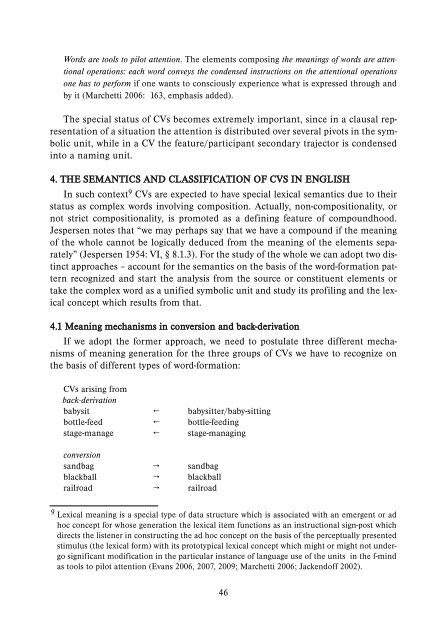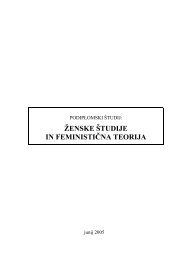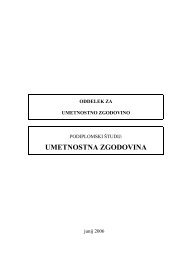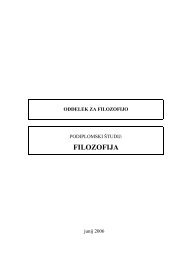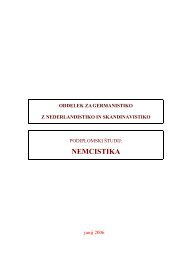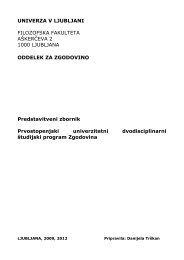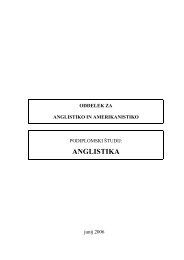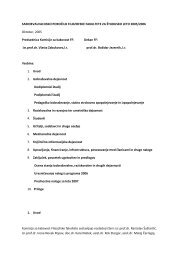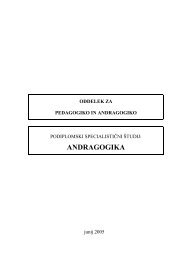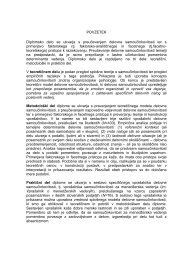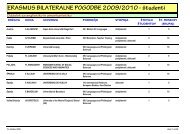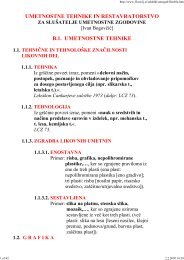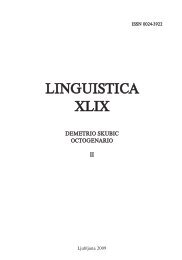- Page 1 and 2: LINGUISTICA LI LES FRONTIÈRES INTE
- Page 3 and 4: PrÉsentation Au cours des dernièr
- Page 5 and 6: Michel Roché UDK 811.133.1'373.611
- Page 7 and 8: mêmes révélatrices. Outre cheval
- Page 9 and 10: pineraie, teck → teckeraie. Il en
- Page 11 and 12: - Le seul interfixe utilisé est l
- Page 13 and 14: est une philosophie fondée sur la
- Page 15 and 16: orange ‘fruit’ / un orange ‘a
- Page 17 and 18: pas du même fruit et du même arbr
- Page 19 and 20: des mots comme une dynamique propre
- Page 21 and 22: TLF = Trésor de la langue françai
- Page 23 and 24: Irena Stramljič Breznik UDK 811.16
- Page 25 and 26: In Slovene linguistics, the overvie
- Page 27 and 28: 4 SELECTION OF MATERIAL 4.0 On the
- Page 29 and 30: “Sankanje” (sledding): sankalec
- Page 31 and 32: 5.1.1.3 Verbal derivatives also fol
- Page 33 and 34: more detailed corpus analysis has c
- Page 35 and 36: in general (žogošport, žogošpor
- Page 37 and 38: STRAMLJIč BREZNIK, Irena (2003)
- Page 39 and 40: Alexandra Bagasheva UDK 811.111'373
- Page 41 and 42: construal mechanisms used to concep
- Page 43 and 44: nitive effects of a specific word-f
- Page 45: In the first sentence the verb name
- Page 49 and 50: In terms of its part-of-speech syst
- Page 51 and 52: towards the manner subordinate extr
- Page 53 and 54: A. [X F,D,P]V - a single-scope blen
- Page 55 and 56: design in the following sense: desc
- Page 57 and 58: MARCHAND, Hans (1969) The Categorie
- Page 59 and 60: EVANS, Vyvyan/Andrea TYLER (2005)
- Page 61 and 62: MICHAELIS, Laura/Knud LAMBRECHT 199
- Page 63: Povzetek ONSTRAN DIHOTOMIJ: O NARAV
- Page 66 and 67: stem-based inflectional classes; th
- Page 68 and 69: The stem may not simply bear lexica
- Page 70 and 71: (3.2.3) respectively, which both ha
- Page 72 and 73: distinct sub-patterns within SBIC I
- Page 74 and 75: stems. While the latter class of ve
- Page 76 and 77: 3SGM’s stem-form should be expand
- Page 78 and 79: low verbs with a CV:C verbal base,
- Page 80 and 81: at the alternating paradigms below
- Page 82 and 83: more relevant than that found in th
- Page 84 and 85: comments by Stephen Anderson, “An
- Page 87 and 88: Arnaud Léturgie UDK 811.133.1'373.
- Page 89 and 90: l’amalgamation lexicale au sein d
- Page 91 and 92: dont son propre Distractionnaire (1
- Page 93 and 94: double troncation. Les amalgames do
- Page 95 and 96: 7 6 5 4 3 2 1 0 1979-1984 1985-1990
- Page 97 and 98:
type d'amalgamation exemple in vivo
- Page 99 and 100:
type d'amalgamation (8) avec segmen
- Page 101 and 102:
ne respectant que TRONC INT 24 . Ce
- Page 103 and 104:
HUDDLESTON, Rodney/Geoffrey PULLUM
- Page 105 and 106:
Silvia Cacchiani UDK 811.131.1'373.
- Page 107 and 108:
- splinter + splinter: edilplast <
- Page 109 and 110:
3. DATA ANALYSIS Blending is not go
- Page 111 and 112:
c. When blend’s size differs from
- Page 113 and 114:
ni/ < enterogermina /ˌɛnteroʤer
- Page 115 and 116:
avvertito [gastro-aware], gastrocol
- Page 117 and 118:
On a gradient from more to less mor
- Page 119 and 120:
RENNER, Vincent/François MANIEZ/Pi
- Page 121 and 122:
Thomas Schwaiger UDK 31'366 Univers
- Page 123 and 124:
or express, reduplicative construct
- Page 125 and 126:
course, on the one hand, the extrem
- Page 127 and 128:
(2) Eastern Oromo (Afro-Asiatic, Et
- Page 129 and 130:
3.3 Reduplicative constructions vis
- Page 131 and 132:
surprising since these authors conc
- Page 133 and 134:
HURCH, Bernhard/Motomi KAJITANI/Ver
- Page 135 and 136:
Eva Sicherl UDK 811.163.6'373.611:8
- Page 137 and 138:
dekle > dekletce/deklica (standard)
- Page 139 and 140:
3 TYPOLOGY OF DIMINUTIVES IN SLOVEN
- Page 141 and 142:
When equivalent English terms for S
- Page 143 and 144:
Marie-Anne Berron UDK 811.133.1'366
- Page 145 and 146:
dans les grandes villes de province
- Page 147 and 148:
mais la plupart du temps, on offre
- Page 149 and 150:
Procédés formels français Procé
- Page 151 and 152:
trois - ce terme est absent du dict
- Page 153 and 154:
Les résultats chiffrés du tableau
- Page 155:
Résumé LA MORPHOLOGIE MARGINALE D
- Page 158 and 159:
Canonical inflection is supposed to
- Page 160 and 161:
as opposed to lexemes, and for whic
- Page 162 and 163:
4. The stem formation rule computes
- Page 164 and 165:
SINGULAR PLURAL p1 suis sommes p2 e
- Page 166 and 167:
As mentioned above, within PARSLI t
- Page 168 and 169:
where ξ~ stands for the inflection
- Page 170 and 171:
P1 P2 P3 IND.PRES SINGULAR PLURAL a
- Page 172 and 173:
B.2 Morphosyntactic features B.2.1
- Page 174 and 175:
B.4.3 inflection zones Let z be an
- Page 176 and 177:
B.8 Paradigms Let (K I , C I , s I
- Page 178 and 179:
C.2 Building the paradigm of the in
- Page 180 and 181:
Abstract MEASURING MORPHOLOGICAL CA
- Page 182 and 183:
The analysis in this study relies o
- Page 184 and 185:
(6) a. condensátion (/e/ is not re
- Page 186 and 187:
(10) *(**]* *(*]* *(*]* (*]* Améri
- Page 188 and 189:
At the next phase, n 1 P, the affix
- Page 190 and 191:
The next issue to be discussed is t
- Page 192 and 193:
(24) Metrical Well-formedness, Burz
- Page 194 and 195:
8.1. Stress preservation and mixed
- Page 196 and 197:
(34) aP a vP -able v √P oper- -at
- Page 198 and 199:
IDSARDI, William (1992) The Computa
- Page 201 and 202:
Patrizia Cordin UDK 811.13'367.625
- Page 203 and 204:
e’) coertàr su to cover with a b
- Page 205 and 206:
also the spelling out of a goal/res
- Page 207 and 208:
I give the cake to the kids Accusat
- Page 209 and 210:
Finally, as a further confirmation
- Page 211 and 212:
tive to space, but it is also relat
- Page 213 and 214:
References ALTR - CORDIN, Patrizia
- Page 215 and 216:
ROHLFS, Gerhard (1969) Grammatica s
- Page 217 and 218:
Erich R. Round UDK 811.72’366 Uni
- Page 219 and 220:
1. IDENTITY OF EXPONENCE AND ITS AN
- Page 221 and 222:
PARTS of the morphomic representati
- Page 223 and 224:
At the morphomic level all of the r
- Page 225 and 226:
d. {DANATH,σ} → M T ∙M N ∙μ
- Page 227 and 228:
shows the inflectional derivation t
- Page 229 and 230:
M ACT which realises the inflection
- Page 231 and 232:
Georgia Zellou UDK 811.411.21(64)
- Page 233 and 234:
Finally, general abstract nouns can
- Page 235 and 236:
(8) Tashelhit (Southern Morocco) Ba
- Page 237 and 238:
inflectional morphology reanalyzed
- Page 239 and 240:
The circumfix in Berber is just /t-
- Page 241 and 242:
Since the original nouns are native
- Page 243 and 244:
Phillipines).” Presented at Morph
- Page 245 and 246:
Chikako Shigemori Bučar UDK 811.16
- Page 247 and 248:
(6) Ryoori no hon ga hosii. cooking
- Page 249 and 250:
3.2 Borrowings Toporišič (2000),
- Page 251 and 252:
Table 1: Gender and number assignme
- Page 253 and 254:
This is the interpretation of anima
- Page 255 and 256:
words ending in -e are masculine (T
- Page 257 and 258:
(39) Srajca v stilu japonskega kimo
- Page 259 and 260:
Many nouns of Japanese origin have
- Page 261 and 262:
SHIBATANI, Masayoshi (1990) “The
- Page 263 and 264:
Varja Cvetko-Orešnik UDK 811.21’
- Page 265 and 266:
The naturalness scales are an essen
- Page 267 and 268:
espect.) Therefore the simplex is m
- Page 269 and 270:
The two variants: +/-acceptable cau
- Page 271 and 272:
The two variants: +/-accusative of
- Page 273 and 274:
Douglas Lightfoot UDK 811.112.2’3
- Page 275 and 276:
1987), Stevens (2000: 58-59) sought
- Page 277 and 278:
A simple Google search reveals, how
- Page 279 and 280:
ecorded since at least the OHG era
- Page 281 and 282:
ent subclasses of affixoids need to
- Page 283:
Povzetek PREVERJANJE SUFIKSOIDIZACI
- Page 286 and 287:
Johnson (2003: 69-70), causation is
- Page 288 and 289:
PrGmc *hert- ‘heart’ + *jα- >
- Page 290 and 291:
LAKOFF, George/Mark JOHNSON (2003)
- Page 292 and 293:
(n.) ‘darkness’. The last examp
- Page 294 and 295:
vation) determined exactly the same
- Page 296 and 297:
Bibliography References BENVENISTE,
- Page 299 and 300:
Marc Plénat UDK 811.133.1'36 Jardi
- Page 301 and 302:
Les choses se compliquent lorsque l
- Page 303 and 304:
égulières. On aurait probablement
- Page 305 and 306:
Nous avons (Plénat, à par.) exami
- Page 307 and 308:
upture intonative et l’éventuell
- Page 309 and 310:
Dans les constructions « disloqué
- Page 311 and 312:
la sélection des variantes adjecti
- Page 313 and 314:
FéRY, Caroline (2004) « Liaison a
- Page 315:
Povzetek VEZANJE PRIDEVNIKA S SAMOS
- Page 318 and 319:
(a) The speaker/hearer parameter. I
- Page 320 and 321:
4. Notes 4.1. Value A of scale 1.1
- Page 322 and 323:
I.e., the colloquial language is mo
- Page 324 and 325:
The two variants: the imperative fo
- Page 326 and 327:
1.2. >nat (+, -) / imperative = ind
- Page 328 and 329:
why the two cases are stable or, mo
- Page 330 and 331:
(13) Modern Greek. The second perso
- Page 332 and 333:
Abstract THE IMPERATIVE IN NATURAL
- Page 334 and 335:
Pour C. Marchello-Nizia (2006 : 15)
- Page 336 and 337:
Le gérondif est apprécié surtout
- Page 338 and 339:
hiša (une maison « brûlante » (
- Page 340 and 341:
avons pu établir le taux de la gra
- Page 342 and 343:
(17) Sodeč po včerajšnji razprav
- Page 344 and 345:
(22) en cas de vacance simultanée
- Page 346 and 347:
(34) Par dérogation à l’article
- Page 348 and 349:
Résumé LE GéRONDIF ET LE PARTICI
- Page 350 and 351:
develop a generative syntactic acco
- Page 352 and 353:
cal weakening, the final result of
- Page 354 and 355:
Zanuttini (1989) and Rowlett (1997)
- Page 356 and 357:
) Učitelj ne sili študentov reše
- Page 358 and 359:
(9) a) Nei ne nücamo. not notneed
- Page 360 and 361:
Stage 1: Clitic-like negation Stand
- Page 362 and 363:
LAKA, Miren Itziar Mugarza (1990)
- Page 365 and 366:
Mojca Smolej UDK 811.163.6’367.63
- Page 367 and 368:
La différence fondamentale entre l
- Page 369 and 370:
tega študenta, in ta študent …
- Page 371 and 372:
- L’utilisation de l’article d
- Page 373 and 374:
ment que nous avons affaire à une
- Page 375:
Povzetek KAJ IMATA SLOVENščINA IN
- Page 378 and 379:
sind miteinander kombinierbar und k
- Page 380 and 381:
letztendlich „einmalig vorkommend
- Page 382 and 383:
und den Beziehungen zwischen Handlu
- Page 384 and 385:
Wörtern und Beispielen, die häufi
- Page 386 and 387:
enti variabili prese in considerazi
- Page 388 and 389:
Sullo sfondo di quanto appena detto
- Page 390 and 391:
affaella Bombi e Fabiana Fusco (a c
- Page 392 and 393:
dalla capacità di focalizzare l’
- Page 394 and 395:
un ammasso entropico, ben difficile
- Page 396 and 397:
Radimský s’inscrit dans le cadre
- Page 398 and 399:
Il est intéressant que J. Radimsk
- Page 400 and 401:
les adjectifs désignant les couleu
- Page 402 and 403:
nement (citons, entre autres, l’i
- Page 404 and 405:
13. Gramática descriptiva de la le
- Page 406 and 407:
43. Vincenzo ORIOLES: Voci di origi
- Page 408 and 409:
69. Quaderni di filologia e lingue
- Page 410 and 411:
entitete ali teorija naravnosti v k
- Page 412 and 413:
128. MAGNÚS PéTURSSON: Grundlagen
- Page 414 and 415:
158. Andrej BEKEš: Japanese suppos
- Page 416 and 417:
k španskemu slovničarstvu: »Spae
- Page 418 and 419:
212. Varja CVETKO-OREšNIK: Natural
- Page 420 and 421:
Miguel de Cervantes Saavedra 151 Ge
- Page 422 and 423:
Johannes Malalas 5 Witold MAŃCZAK
- Page 424 and 425:
Karmen TERŽAN-KOPECKY 100 Zuzanna
- Page 426 and 427:
~ infinitive 56, 190, 191, 192 nedo
- Page 428 and 429:
gotique 16 gotščina grammaire 63,
- Page 430 and 431:
modalité déontique 23 deontična
- Page 432 and 433:
sonantes en final de mot 106 zvočn
- Page 434 and 435:
stVarno Kazalo - indeX tHÉmatiQue
- Page 436 and 437:
glagolske perifraze 39, 111, 149 p
- Page 438 and 439:
korziščina 41 corse krajevna imen
- Page 440 and 441:
povezovalci 24 connecteurs praslova
- Page 442 and 443:
teorija jezikovne naravnosti théor
- Page 444 and 445:
Eva Sicherl/Andreja žele NOMINAL D
- Page 446 and 447:
COMPTES RENDUS, RéCENSIONS, NOTES


